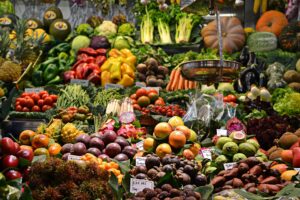 What is the food waste crisis?
What is the food waste crisis?
As Stop Food Waste Day is at the end of this month (28th April 2021), we decided to provide an insight into the food waste crisis and why this day is crucial in raising awareness. Humans have impacted the climate and environment more than any other species. Food waste is one of the primary issues that has resulted from our behaviour and requires urgent action.
The UN’s Food and Agricultural Organisation (FAO) has a panel of experts advising their decisions on policymaking, Professor Per Pinstrup-Andersen is the head of these specialists. He famously said, ‘If food was as expensive as a Ferrari, we would polish it and look after it.’ This highlights the wasteful nature of humanity; we throw away staggering amounts of food daily. It has been estimated by the UN’s FAO that 1.3 billion tonnes of food produced for human consumption are wasted or lost, equating to one-third of food produced globally. Food waste occurs throughout the supply chain, from the manufacturer to the household. Globally, more than 97% of food waste produced ends up in a landfill, this amounts to 33 million tonnes. Food produced but not eaten generates a carbon footprint of 3.3 gigatons of carbon dioxide each year. If food waste were a country, it would follow the USA and China as the third-largest emitter of greenhouse gases. A complete stop in food waste production would have environmental benefits similar to taking 1 in 4 cars off the road.
The scale of household food waste
Household food waste represents 70% of all food waste after the food has been grown or produced. The UK produces roughly 6.6 million tonnes of household food waste annually, 60% of this could have been avoided. Such a vast quantity of waste has been priced at £10.2 billion and £700 for an average family with children. To put this into perspective, 10 billion edible meals are wasted every year in the UK. Research shows that without intervention, UK food waste could increase by 1.1 million tonnes by the year 2025. Just five years after that, by 2030, it has been estimated by the Waste and Resources Action Programme (WRAP) that global household food waste could have doubled with annual costs of US$600 billion.
 We have seen progress so far, in the UK the hospitality sector, retail supply chains, and homes have reduced the volume of food waste generated from 10 million tonnes in 2015 to 9.5 million tonnes in 2018. Additionally, household food waste has decreased by 6%, from 7.1 million tonnes to 6.6 million tonnes in the three years leading up to 2020.
We have seen progress so far, in the UK the hospitality sector, retail supply chains, and homes have reduced the volume of food waste generated from 10 million tonnes in 2015 to 9.5 million tonnes in 2018. Additionally, household food waste has decreased by 6%, from 7.1 million tonnes to 6.6 million tonnes in the three years leading up to 2020.
Impacts of the food waste crisis
Food waste results in environmental, economic, and social impacts. Economic effects include the cost of wasted food in households and disposal costs that local authorities face. WRAP stated that UK food waste is responsible for 20 million tonnes of greenhouse gas emissions.
Social impacts look at food waste coupled with the number of people struggling to put food on the table. The United Nations have estimated that one in nine people on this planet are undernourished. Meanwhile one-third of food produced is lost or wasted. Each person could be sufficiently fed on under a quarter of food wasted in the UK, USA, and Europe. Hunger is not happening somewhere else; it is prominent here in the UK. During 2020, approximately 1.9 million people accessed a food bank. Approximately 8.4 million families, equivalent to the population of London, struggle to find daily meals. As a country, we are within the bottom half of countries in Europe for food insecurity.
Why is this Stop Food Waste Day even more crucial than others? The UN set a target of halving global food waste by 2030. Therefore, 2021 marks the start of a critical decade to reduce food waste and reach this target. We are visibly seeing the effects of climate change every day, it is unsustainable for us to continue wasting food at the current rate. Aside from the need to act on climate change, with almost one billion people going hungry every day, there is a humanitarian crisis that requires urgent attention.
What can you do?
Here are Climate Wise’s top tips for cutting down your food waste:
- Plan your meals, so you only purchase what you need.
- Use WRAPs idea of a ‘shelfie’ – a photo of your fridge and cupboards to remind you of what you already have.
- Check ‘use by’ dates and make sure you can use the item before it expires. Note: ‘best by’ is the suggested date that the food should be consumed before, the one to look out for is ‘use by’.
- A massive amount of food waste is caused by improper storage. Check the label and store your food correctly.
- Make the most of your freezer. Freezing is an easy way to preserve food, and the types of food that can be frozen are endless.
Another action you can take is offsetting your carbon footprint, which the food you waste contributes too. Click here to find out more.






